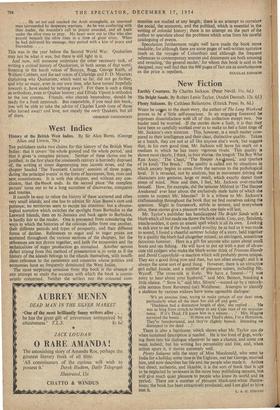New Fiction
Earthly Creatures. By Charles Jackson. (Peter Nevill. II s. 6d.) WHEN he costes to the short story, the author of The Long Weekend proves to be a little self-conscious. In an engaging foreword he expresses dissatisfaction with all of this collection except two. No reader need be worried. If the stories show a fault, it is that they have been so carefully worked over as to make us feel a faint tinge of Mr. Jackson's own mistrust. This, however, is a small matter com- pared to their intelligence and their clear, distinctive quality. Taken as a bunch, they are not at all like anyone else's work, but suggest that, in his own good time, Mr. Jackson will leave his mark on a medium in which he has many vigorous rivals. This quality is shown most clearly, I think, in four stories: the longish 'The Boy Who Ran Away,' The Cheat,' The Sleeper Awakened,' and (perfect of its kind) 'The Break.' The quality is called out by situations in which anxiety begins to cross from the nervous to the pathological level. It is revealed, not by analysis, but in movement driving the characters into gestures, large or small, which exactly depict their stress of mind. Now and then, I feel, Mr. Jackson over-reaches himself. How, for example, did the spinster Mildred in 'The Sleeper Awakened' ever hear about the exclusively male habit of which she comes to suspect Mr. Menzies? It is a tribute to Mr. Jackson's craftsmanship throughout the book that we find ourselves asking the question. Slight in framework, subtle in texture, and everywhere alive, these stories give a pleasure which one feels will last.
Mr. Taylor's publisher has handicapped The Bright Sands with a blurb which all but made me throw the book aside. Cosy, coy, flatulent, treacle-sodden, it casts an emetic spell which is all its own. Looking in sick awe to see if the book could possibly be as bad as it was made to sound, I found a cheerful summer holiday of a story, held together by a quality the blurb had altogether missed; an astringent, sometimes ferocious humour.. Here is a gift for anyone who cares about small boats and sea fishing. He will have to put up with a pair of oh-so- cute old codgers who make the blurb writer think of Tristram Shandy and David Copperfield—a reaction which will probably prove unique. They say a good thing now and then, but not often enough: and it is always the same sort of good thing. However, there is an attractive girl called Joanie, and a number of pleasant supers, including Mr. Wycoff. The cross-talk is lively. We have a funeral—' "I was sorry to hear about your husband," said Mrs. Benson, breaking a little silence. " Stow it," said Mrs. Silvera'—wound up by a remark- able sermon from Reverend (sic) Waldbeser. Attempts to identify a skeleton by various widows have some agreeable dialogue: 'It's an anxious time, trying to make certain of our dear ones, particularly when all the meat has slid off and gone.'' 'Thaddeus had a distinctive length of shin,' she replied . . . He was as long from crotch to instep as any Cape man of my acquain- tance. If it's Thad, I'll know him in a minute . . .' Mrs. Higgins surveyed the bones ... 'If those are Thad's shins, I'm a Hottentot. They're foreshortened, and they're slightly bowed. Intending no disrespect to the dead. .
There is also a hurricane, which shows what Mr. Taylor can do when sustained description is needed. He is too fond of gags, work- ing them into his dialogue whenever he sees a chance, and some are weak indeed; but his writing has personality and bite, and, when action spurs it, it moves extremely well.
Plenty Sakatns tells the story of Miss Macdonald, who went to India for a holiday some time in the Eighties, met her George, married him, and now describes her life and the people who made it. Artless but direct, authentic, and likeable, it is the sort of book that is apt to be neglected by reviewers in the more busy publishing seasons, but will give much quiet pleasure to people who knew its world and its period. There are a number of pleasant black-and-white illustra- tions; the book has been attractively produced; and I am glad to have


































 Previous page
Previous page